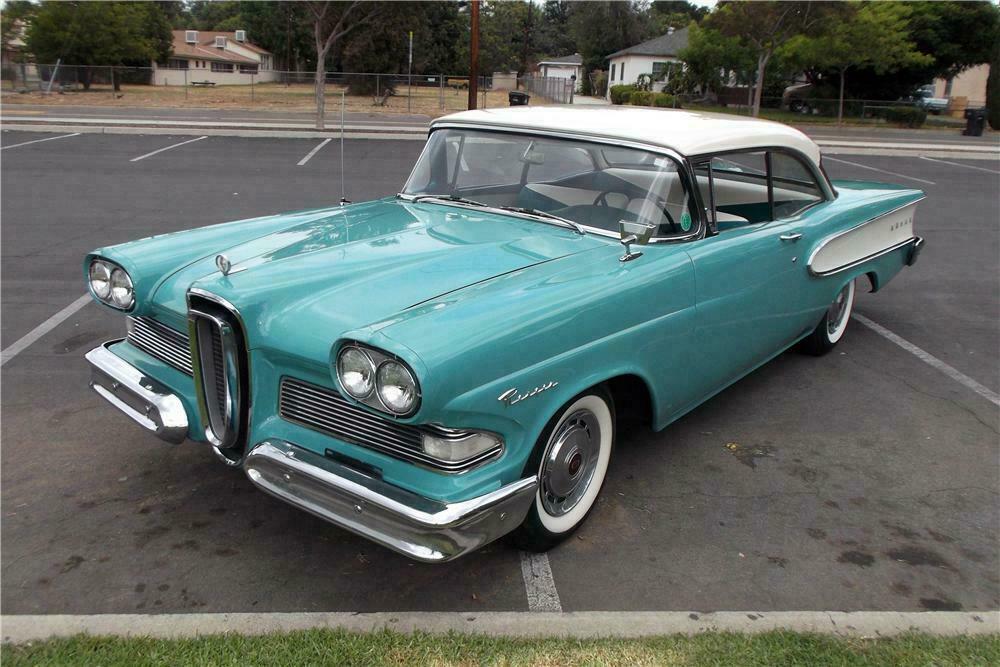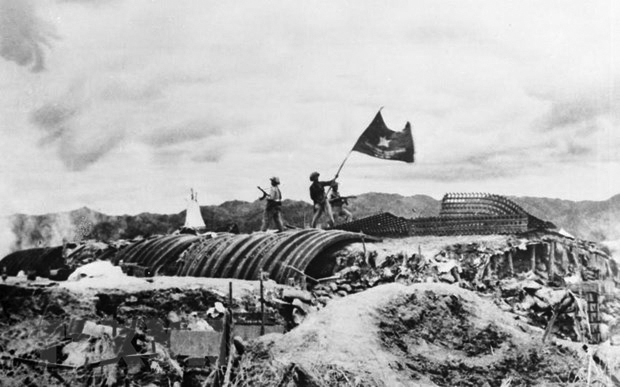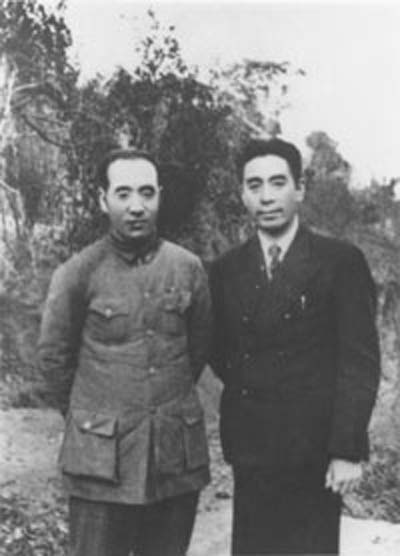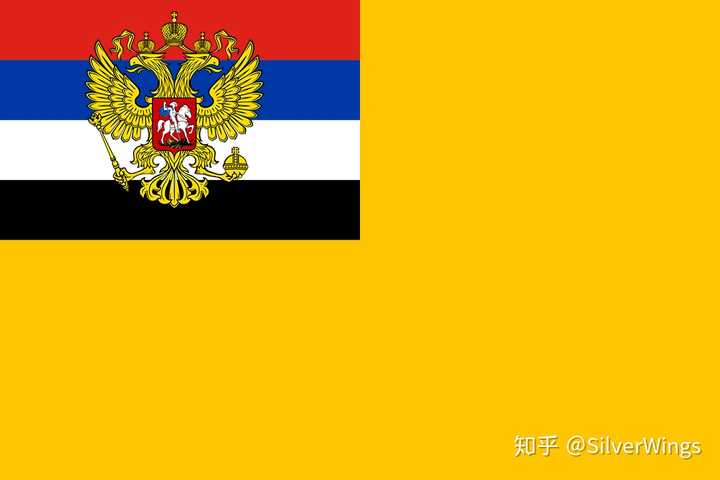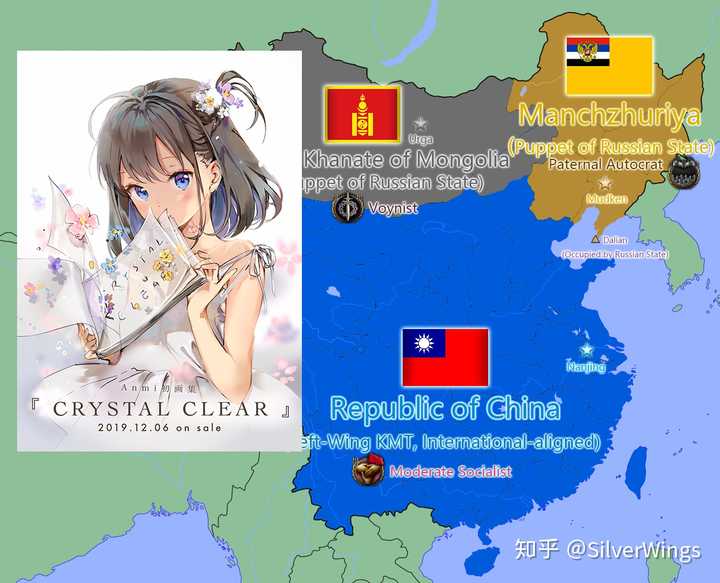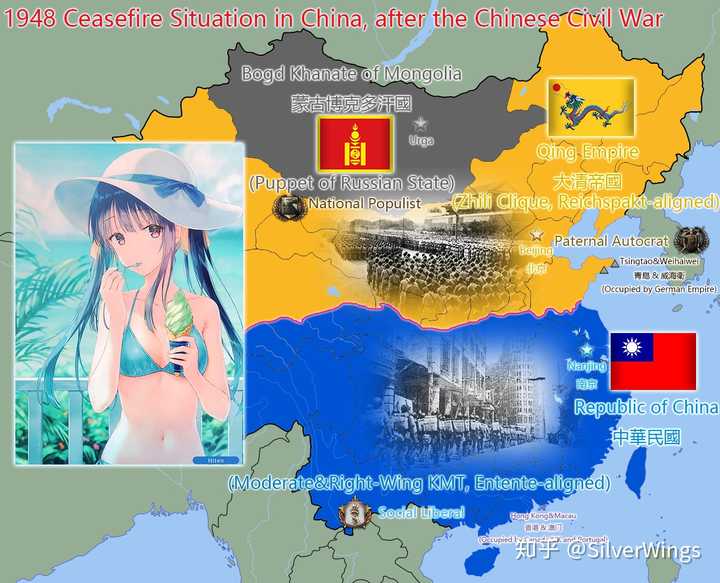We're doing full writeups now?
I'm posting based on a world where Syndicalism got pretty lucky. Everything seemed pretty OK, if unstable under the surface, until '36, where Savinkov seized power in Russia and the notoriously corrupt, incompetent, and just plain weak Hoover administration effectively collapsed in America. Mainstream Syndicalists, banking on solid economic states prior to the Berlin crash, managed to maintain control in France and Britain during their Trade Union Congresses. The Entente went conservative-revanchist and the Kaiser elected to go social-democrat in an attempt to stem the tide of Syndicalism, which led to support from social-democrat Austria.
In '36, Reed won the Presidency despite winning barely 30% of the vote, due to a horrible split between the Democrats and Republicans that led to their 50% becoming 25% each; the end result was an unstable and controversial Syndicalist rule. Huey Long refused to comply, and Dougie Mac tried to coup Reed; however, in the ensuing mess Reed escaped to Chicago, and a General Strike was declared across the Midwest, PA, NJ, and parts of New York. Huey Long, seeing his chance and knowing MacArthur would screw him, rebelled as well. The PSA seceded as well, resulting in a three-way conflict for MacArthur's regime, which was soon forced to relocate to Denver after a Syndicalist conquest of Washington.
Jack Reed insisted on playing nice; he was the legitimate President, after all, the Workers of America were liberating territory held by unjust bourgeois oppression, not conquering cities from the enemies of the American people. Therefore, there would be no looting, no purges (maybe a few imprisonments of notorious Long or MacArthur sympathizers, but no executions), and a general respect for human rights and decency. Inexperienced but bolstered by Franco-British aid and the raw industrial power of the Midwestern heartland, the Combined Syndicates swiftly re-took New England, then moved south to take on the AUS. Facing dissent from many loyalist troops who weren't happy with the apparent rebellion against the President despite not liking Syndies, MacArthur was forced to focus on the PSA and AUS first.
Huey Long was killed, allegedly during the Battle of Richmond, in early 1937. Nat-Pop racist extremist William Pelley took over in his place, and began plans to "get rid of the Negro" once and for all. A campaign of ethnic cleansing, enslavement, and outright murder was his main method of terror, outraging the Syndicalists and sparking major black uprisings. After the Syndicalists seized Atlanta, the USA cut a peace deal with the PSA; recognition of PSA independence in return for pre-war state borders. It worked, but cost MacArthur a lot of support, and several divisions deserted to the Syndicalists, seeing them as the legitimate USA.
MacArthur lasted until October 1939, when the Syndicalists took Denver. The dictator, pressured by Dwight Eisenhower, Admiral Spruance, and Smedley Butler, surrenders to the Combined Syndicates government on October 25th. The Combined Syndicates regime then demands that the PSA recognize their control over the Pacific states; seeing the writing on the wall and facing a major strike, the PSA caves and is annexed on New Year's.
Meanwhile, Europe is about to explode. The Syndicalist victory in America and their petition to join the Third Internationale sends shockwaves across the capitalist world, and the declaration of a socialist republic in Ukraine by Nikita Kruschev draws both Russian and German ire. Boris Savinkov, head of the nightmarish totalitarian Russian State, leads a fanatically revanchist, anti-German (and anyone who might be of Germanic descent), antisemitic, anti-Syndicalist, anti-monarchist regime (literally Russian Nazis), and declares war on Ukraine, followed swiftly by Germany as they intervene.
The Commune of France, having bullied Switzerland into surrendering key lands on the border, sees its chance, but before it can march into Alsace-Lorraine, the Entente, seeking the end of Syndicalism, declares war on the Third Internationale. It is a costly mistake. While the invasion of mainland France by the French Republic inadvertently saves Germany, it is repulsed and ultimately reversed, and the Canadian invasion of Britain is an utter failure that results in Canada being undefended against a massive American invasion with which many Canadian dissidents (sick and tired of British exiles' upper-class lording it about) sympathize. Canada falls dramatically in a matter of mere months, capitulating in February 1942. The rest of the war, however, takes a further 2 years, as the Bharatiya Commune is aided by Red America and France in their conquest of the Dominion of India and Princely Federation. Seeing no way out, the British government-in-exile retreats to Australia and peaces out. The French Republic is dismantled, and the recently-renamed PRUSA finishes off La Plata by sending over a dozen volunteer divisions to help Syndicalist Brazil. A Red flag rises over the Western hemisphere as the Zapatistas in Mexico sign a treaty of eternal friendship with Red America in exchange for a mutual abandonment of border claims. Japan, trying to contain the Syndicalists, gambles on its naval strength to end the Americans' spirits and secure its rule over Hawaii, but is unable to break the American navy quickly enough, launching a grueling conflict in the Pacific.
On the Eastern front, resistance to the monstrous Nat-Pop regime of Savinkov's Russia is stiff but slowly failing against the Russian tide. Austria-Hungary has successfully broken the Hungarian nobility politically and reformed into a more federal, democratic Danubian Federation, but they don't have the troops to handle Nat-Pop Romania and the Russians at once. Meanwhile, the Middle East is disintegrating around the Ottoman-Axis war, and the AOG pulls out of China in the face of revanchist Qing demands. The Communards, pressured by an America that loathes Savinkov and swayed by tales of the Russian despot's perverse cruelties against the Syndicalist Ukrainian people, agree to a temporary ceasefire with Germany. Besides, the Germans have put in some protections for workers, and administering the remains of the French Republic and preparing the new Syndicalist states for independence is a bear of a task.
In 1945, the Internationale declares war on Nat-Pop Portugal after the massacre of a group of striking workers to aide the CNT-FAI in the grueling Spanish civil war. This theater is over by 1946, as American arms and Franco-German man-power take Lisbon in months. Savinkov is losing ideological allies, even as the killing fields of White Ruthenia and Ukraine claim a generation. Then the unthinkable happens; China, reunited under the Qing banner, allies with Boris Savinkov, lending half a billion souls to the Nat-Pop titan. Launching a devastating attack on the German Empire's remaining Indochinese colonies and the Empire of Japan, the Qing advance spurs the Americans into action once more. The Americans land on the Home Islands, the broken shell of the Empire of Japan their staging ground for a strike on Korea and Vladivostok, and the Third Internationale declares war on the Russian State and Qing Empire.
The result is a brutal conflict from 1948-1954. Initial American landings in China are repulsed, but a small force sent into Russia is able to hold off the Chinese with supplies shipped in via Attu for years on end, giving Red America a toehold. Savinkov's desperate attempts to redirect forces finally give Mitteleuropa a bit of breathing room, and they regroup before launching a massive attack into the Russian heartland.
The Second Weltrkieg, popularly known as the Final War of Humankind, officially ends on August 7th, 1954. The ceasefire between the German Empire and Commune of France is maintained, but Russia and China are broken up between the Paneuropa League and the Third Internationale. Bharat controls India but is grumpy about the loss of Ceylon, the Turks lost Istanbul after allying with Savinkov and getting into a fight with Greece, and the former Axis fall to bickering amongst themselves over the remains of the Ottoman Empire. An uneasy peace falls over the world as Paneuropa and the Internationale focus on rebuilding.
The 1960s are marked by (mostly) peaceful decolonization and the strengthening of Syndicalist and Paneuropan ties. Britain, scarred by Mosley's attempted coup, becomes a prominent anti-Totalist voice, and Red America becomes the de facto undisputed leader of the Third Internationale. Counterculture movements in the 1970s lead to a gradual loosening of sexual and gender norms; although trans people still face challenges, gay marriage was legalized by America in 1971 and Germany in '89. The 1980s are marked by gradual detente between Paneuropa and the Internationale, as both sides realize that taking on the other just isn't worth it. By the end of the 1990s, the only real fight is between the Germans and the French, everybody else is too busy trading to really put an effort into spreading THE REVOLUTION! or Suppressing Radical Elements.
The modern world is broadly free and peaceful. The US expects lesser Syndicalist countries to have at the bare minimum a reasonable facsimile of democracy without in-your-face oppression (Bharat, which has become a nasty place comparable to the later Brezhnev era USSR, is currently at risk of being kicked out of the Internationale for this despite its size and economic importance), and about 2/3 of the Internationale genuinely lives up to the ideology's promise or at least makes the effort; most of the rest pay lip service to Syndicalism but really run on corruption (see, Brazil, which still has democracy but you can buy a very expensive bottle of wine and have El Presidente remove a little red tape for you to build your new farm on protected land). The Germans have developed a very robust, democratic constitutional monarchy, and most of their bloc have a similar structure or are, if perhaps populist and a bit authoritarian, at least encouraged to have international observers watch their elections. Former Mittelafrika is a system of grudgingly or willingly German-allied regional federations, and the Germans aren't stupid enough to try to mess around in there again. Australasia is the big neutral, and is a British-style parliamentary democratic constitutional monarchy. They lifted Emergency Police Rule in the 1960s and never looked back.
The unfreest place on Earth is Turkey, which is still mellowing out from the Nat-Pops (think the reverse of the current trend--the current leader is a bombastic strongman like Erdogan but he's slowly mellowing and even lets the press operate freely now), or perhaps Egypt, which has a lot of bad history with the Arab disputes. The Middle East is broadly better off than OTL, though, with less of a postcolonial mess and less internecine strife.
It's not a perfect world, far from it, and the 1940s and 1950s were basically one long slog of Grey On Black morality, but these days it's kinda noblebright.

